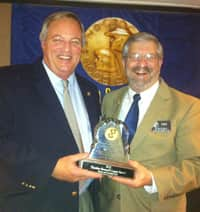Ducks Unlimited Presented with 2012 Theodore Roosevelt Legacy Award
Ducks Unlimited 03.21.12

Ducks Unlimited has been chosen to receive the Boone and Crockett Club’s (B&C) prestigious Theodore Roosevelt Legacy Award for 2012. B&C President Ben Wallace presented the award to DU CEO Dale Hall on March 14 during the North American Wildlife and Natural Resources Conference in Atlanta. The award was created in 2008 to honor the collaborative spirit of America’s greatest conservationist, Theodore Roosevelt.
“This award is a way for us to highlight and encourage people and organizations working together to achieve great things,” said B&C President Ben Wallace. “Cooperative partnerships have proven crucial throughout the history of conservation—and they’re going to be even more important in the future.”
Etched on the award, the Boone and Crockett Club thanks DU “For its 75 years of extraordinary dedication to conserving over 12 million acres of waterfowl habitatand influencing 96 million more through partnerships and policy.”
“Ducks Unlimited is truly honored to receive this prestigious award,” Hall said. “The Boone and Crockett Club and Ducks Unlimited have a rich conservation partnership history, sharing a strong commitment to wildlife and conservation. This award is especially humbling to me as a professional member of B&C. We are extremely proud of our long association with Boone and Crockett.”
In 1934, President Franklin D. Roosevelt appointed two B&C members, Jay “Ding” Darling and Aldo Leopold, to a committee with Thomas Beck to assess the dismal state of migratory birds and to recommend actions. Together they proposed the Migratory Bird Hunting and Conservation Stamp Act, which soon became law. The act provided that funds from sales of federal duck stamps would be used to acquire land for the National Wildlife Refuge System, established earlier by B&C founder Theodore Roosevelt.
In 1935, the eventual founders of DU, through an entity they created in 1930 called the More Game Birds in America Foundation, sponsored the International Wild Duck Census, the first comprehensive aerial survey of North America’s most important waterfowl breeding grounds. This survey confirmed the importance of duck habitat conservation in Canada. However, federal duck stamp monies couldn’t be used outside U.S. borders.
So, in 1937, DU was launched for the purpose of raising funds in the United States to secure lands in Canada. A second entity, DU Canada, was established to actually deliver that mission.
Today, DU is the world’s largest and most effective non-governmental organization for waterfowl and wetlands conservation. Supported by legions of dedicated partners and volunteers, DU has raised nearly $3.5 billion and conserved more than 12.5 million acres of waterfowl and wildlife habitat. DU is celebrating its 75th anniversary in 2012.
“Ducks Unlimited has always felt very closely aligned with the Boone and Crockett Club and its philosophy of cooperative conservation,” Hall said. “As the founder of the modern conservation movement, Theodore Roosevelt realized things get done when you work together to achieve a common goal. DU is very pleased and honored to receive this prestigious award from our friends and partners at the Boone and Crockett Club.”

